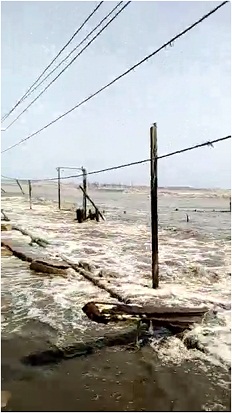FEATURES
Averting Deaths on Nigeria’s Inland Waterways

John Davis (not real name) was a promising young man. He was so brilliant that he passed his university matriculation exam in one sitting, gaining admission to study one of the most coveted courses, medicine.
In addition to his academic brilliance, John also excels in sports.
He is so good that he was selected to represent his school in the medical students game in Calabar, Cross River, he never returned to his parents and other loved ones.John was among the casualties of the recent cruise boat mishap which claimed the lives of two other medical students.
The students were in the Cross River capital to compete for honours but their lives were brutally cut short when their boat capsized at Marina Resort waterways in Calabar.
The students, two from Ahmadu Bello University, Zaria and one from the University of Uyo, Akwa Ibom State, were in the Cross River capital city for Nigeria Medical Students games.
In a swift reaction, Gov. Bassey Otu ordered that all activities in the Marina Resort be suspended until further notice.
In a statement by his Chief Press Secretary, Mr Emmanuel Ogbeche, Otu also ordered a full investigation into the incident.
The leadership of Nigerian Medical Students Association (NIMSA) blamed the management of Marina Resort Calabar, for the accident.
“This ugly, avoidable and extremely traumatizing incident causing so much anguish to the medical students community nationwide was as a result of negligence.
“It is as a result of incompetence and the lackadaisical attitude of the crew members and the management of Marina Resort”, said Egim Egbe, the national president of NIMSA, as he addressed newsmen at the resort.
On the waters between Niger and Kwara, no fewer than 100 hundred wedding guests, including a father and his four children met their untimely death as their boat capsized on their way home after the wedding ceremony.
Abdul Gana Lukpada, the Chief of Kpada in Patigi, Kwara, told the media that some stranded wedding guests had resorted to cross the river from Egboti village in Niger State to Kpada in a boat, as heavy rains caused the roads in the area to be flooded.
In January no fewer than 20 farmers were reported dead after a boat carrying about 100 farmers capsized in the Koko/Besse Local Government Area of Kebbi State.
The police spokesman for the state, DSP Nafiu Abubakar, confirmed the accident.
The Chairman of the Koko/Besse LGA, Alhaji Yahaya Bello, also told the press he was aware of the accident.
He said it occurred at night when a rickety boat carried more than 100 rice farmers to Samanaji, a riverine community in the area.
In May the media reported that 15 persons were feared dead, after a boat carrying many passengers capsized in Shagari Dam, Sokoto State.
According to eyewitnesses, the occupants of the boat were crossing the dam through Lambara village to Shagari when the incident happened.
Media reports quoted the Chairman of Shagari Local Government Area, Alhaji Aliyu Dantani, as confirming the accident.
In Nigeria, water transportation has been a major source movement of people and goods in the riverine areas and ocean coast cities of Lagos, and many others in the Niger Delta region for centuries.
The different types of transportation are associated with different types of risks such as road accident, plane crash, train derailment and boat/ship mishaps.
Debate has raged on which form of transport is the safest. While many argue that it is rail, others say air transportation remains the safest while to some others, it is water.
While the argument rages, Nigeria’s inland water transportation is taking a hit as shown in the series of accidents as highlighted above.
Given the huge population of Nigerians whose daily lives and activities involve water transportation, it was expected that actors in the sector will take appropriate steps to ensure that it is safe.
Data from Nigeria Watch, which project monitors lethal violence, conflicts, and human security in Nigeria showed that no fewer than 1,607 lives were lost in 180 boat mishaps between June 2006 and May 2015.
This figure will pale into insignificance if the water transportation accident continues at the rate it is going.
Maritime experts say many factors, both human and natural, are responsible for the recurring boat mishaps in the country.
Some of the factors include use of rickety boats and ferries, overloading, night journeys, careless piloting and non-adherence to safety standards, including absence of life jackets.
Experts have for long agitated for special attention to make water transportation in the country safe, organised in line with global best practices.
The Federal Government had responded to the demand to make the water ways safe for navigation through various policies and institutions.
For instance it set up the National Inland Waterways Authority (NIWA) with headquarters in Lokoja, Kogi.
It was established through Act Cap 47, Laws of the Federation of Nigeria (LFN), 2004, then degree No 13 of 1997.
It had hitherto existed as Waterways Department of the Federal Ministry of Transport. Its main responsibility is to improve develop the country’s inland waterways for navigation.
Many Nigeria contend that the authority has not leaved up to expectations, an accusation it denies,
The Head of Press and Public Affairs of NIWA, Mr Jibril Darda’u, told the News Agency of Nigeria (NAN) that the authority had been doing its best to deliver on expectations and mandates.
Darda’u said NIWA with George Moghalu as Managing Director has commenced the training and certification of boat drivers nationwide.
He also said that the authority had engaged in in regular safety awareness and sensitisation campaigns across the country.
According to him, this is in addition to regular security and compliance patrols on the waterways by the team of NIWA police.
“NIWA has established nine search and rescue stations in Lagos, Lokoja, Port Harcourt, Yauri, New Bussa among others for timely rescue operations.
“The authority has standardised its inspection of vessels to ensure standard and safety compliance, including determining the River worthiness of the vessels before registration and permit are given.
“It has also deployed its personnel to various loading terminals to provide pre-loading safety talk to passengers and prevent overloading and night sailing as well as the provision of life jacket to boats,” he said.
Another Federal Government agency involved in sanitising the waterways is the Hydropower Producing Areas Development Commission (HYPPADEC).
The commission also denies allegations that it has failed to deliver on its mandates.
The commission’s Head of Press and Public Affairs, Mr Nura Tanko-Wakili said it has commenced the clearance of water logs in the Shiroro, Kainji and Jenna lakes to ease the movement of boats.
Tanko-Wakili said the commission was partnering NIWA to educating stakeholders and the general public on safety guides and use of life jackets.
“We are sensitising the boat and jetty managers on the dos and donts of water transportation and the need to avoid overloading and night journeys.
“By 6.00pm movements on waterways are supposed to stop as the boats have no navigation equipment and proper lightings.
“Some of them have been operating for over 30 years and they are not even aware of the importance of life jackets, while some don’t want to use them because of some beliefs,” the HYPPADEC spokesman said.
According to him, as part of its intervention, the commission has distributed 12,500 life jackets to communities and boat operators to encourage safe travels on waterways.
“A life jacket has a six hours floating capacity within which a victim can be rescued in the event of a boat mishap”.
Although the agencies say they are doing their best, it seems increasing cases of accidents contradict their claims.
Experts say they have to redouble their efforts in several areas of supervision such as meting out appropriate punishment to firms or individuals whose boats are involved in accidents caused by human error.
They say the agencies have to engage the services of more maritime experts within their fold as well as enhance their partnership with relevant agencies such as those involved in weather forecasting.
They also advise the dredging of rivers as well as proper funding of the agencies involved in inland waterways regulation and supervision. (NAN)
FEATURES
What Future For Catholics Under Pope Leo XIV?

In unprecedented and emotionally resonant moments for the global Catholic community, Cardinal Robert Prevost of Chicago was elected Pope on May 8 and inaugurated on May 18.
He became Pope Leo XIV, the 267th successor to St. Peter and the first American-born pontiff in the history of the Roman Catholic Church.
The election of Leo XIV follows the death of Pope Francis on April 21, a pontiff celebrated as “the people’s pope.
”Leo XIV’s inauguration message resonated with advocacy for peace and harmony in a troubled world.
The pontiff said he wanted the Catholic Church to be a “small leaven of unity” in a time of “too much discord and too many wounds”.
Leo harped on the need to preserve the church’s rich heritage while confronting modern challenges.
“In this time of ours, we still see too much discord, too many wounds caused by hatred, violence, prejudice, the fear of difference, and an economic paradigm that exploits the earth’s resources and marginalises the poorest.
“For our part, we want to be a small leaven of unity, communion and fraternity within the world; we want to say to the world, with humility and joy; look to Christ; come closer to him,” he said.
Born on Sept. 14, 1955 in Chicago, Leo XIV was raised in a culturally rich American city and studied mathematics at Villanova University.
He pursued his priestly formation at the Catholic Theological Union in Chicago before obtaining a doctorate in Canon Law from the Pontifical College of St. Thomas Aquinas in Rome.
It was not his academic accolades but the 14 years he spent as a missionary in Peru that most deeply shaped his pastoral identity.
There, in one of South America’s poorest regions, he worked closely with the marginalised, gaining firsthand insight into social injustice, poverty, and spiritual hunger.
This lived experience grounded his commitment to the poor, informed his theology of proximity, and laid the foundation for a papacy rooted in social justice, humility, and global outreach.
Leo XIV’s choice of name is more than ceremonial; it is a carefully calibrated message.
His name honours two great figures in Church history: St. Leo the Great, a fifth-century pope renowned for his doctrinal clarity and steadfast defense of Rome during political and theological turmoil.
It also honours Pope Leo XIII, whose groundbreaking 1891 encyclical Rerum Novarum addressed the plight of workers during the industrial age and laid the foundation for modern Catholic social teaching.
Prof. Brandon Gallaher of the University of Exeter, UK, likened Leo XIV to Francis, whose legacy of inclusivity, environmental stewardship, and concern for the Global South continues to inspire.
“Many analysts believe Leo XIV was chosen as a ‘continuity candidate,’ meant to solidify and institutionalise Francis’s reforms.
“Leo XIV is very much a ‘Francis-like’ pontiff.
“He shares Francis’s concern for the peripheries and the poor, but he also brings a more canonically grounded and disciplined approach to Church governance,” he said.
According to Dr Gonzalo Berenguer, a historian from the University of Bristol, his name, background, and tone all signal a commitment to build on, not reverse, Francis’s revolution in Church life.
Catholic scholars say Leo XIV assumes the papal reins at a moment of significant turbulence for both the Church and the world.
They listed some of the church’s pressing challenges as: Internal Reform and Transparency; ongoing fallout from clergy abuse scandals has damaged the Church’s moral authority; strengthening accountability will be a key focus.
“Social Justice: Poverty, migration, and economic disparity remain core global issues; Leo XIV’s Peruvian experience positions him to speak credibly on these matters.
“Climate Change and Environment: Continuing the legacy of Laudato Si’, Leo XIV is expected to advocate forcefully for ecological stewardship.
“Inclusivity and Youth Engagement: The new pontiff has expressed interest in creating space for women, youth, and marginalised voices within Church structures and discussions.
“Global Engagement: As digital communication reshapes culture, Leo XIV must navigate a path that keeps Catholic teaching relevant and accessible without compromising doctrine.”
The Christian Association of Nigeria (CAN) described Leo XIV’s election as “a milestone of hope and renewal”.
President Bola Tinubu, who attended Leo XIV’s inauguration, lauded the pope’s global perspective and experience with Nigeria’s Augustinian communities, calling Leo XIV’s elevation “a new chapter for Church-African cooperation.”
UN Secretary-General António Guterres hailed Leo XIV as a voice for unity and peace.
“At a time of geopolitical division and deep societal fractures, Leo XIV brings a message the world needs to hear,” he said.
Mr Peter Obi, former Anambra Governor and Labour Party Presidential candidate in 2023, who also attended the inauguration, called the new pope “a respected canon lawyer and seasoned missionary,” highlighting his role as Prefect of the Dicastery for Bishops before becoming pontiff.
Analysts say Leo XIV’s duality of identity is more than symbolic as it informs his leadership style– humble, yet decisive, and his theology–rooted in Gospel fidelity but open to dialogue with the modern world.
Before the conclave, Leo XIV gained attention for his measured but clear social media presence, including posts critical of political leaders he believed misrepresented Christian teaching.
From Rome to Rio, Lagos to Abuja and Los Angeles, Catholics are watching closely; will Leo XIV be the builder of bridges?; the reformer with legal acumen?; the lion-hearted shepherd the Church needs?
The Tinubu Media Support Group (TMSG) described the personal invitation by Leo XIV to Tinubu to attend his inauguration as a reflection of Nigeria’s great stature in the comity of nations.
Mr Emeka Nwankpa, Chairman of TMSG, said that Tinubu was the first Nigerian president in recent memory to attend a papal inauguration.
“When the Presidency announced that Tinubu would attend the inauguration of Leo XIV, it mentioned that the papal invitation by Vatican Secretary of State Cardinal Pietro Parolin underscored the need for the President’s physical presence.
“For us, it represents the importance the Vatican accords the President and the country, especially as the inauguration ceremony was Pope Leo’s first interaction with world leaders.
“Indeed, the Pope had brief interactions with all international leaders in attendance, including Tinubu, U.S. Vice President J.D. Vance, and President Volodymyr Zelensky of Ukraine.”
According to Nwankpa, Tinubu’s presence at the Pope’s inauguration marks the first time in 20 years that a Nigerian leader attended a papal inauguration.
“In 2005, when Pope Benedict XVI was inaugurated, there is no record showing then-President Olusegun Obasanjo attended, though Nigeria had a delegation.
“When Pope Francis was inaugurated in March 2013, the Nigerian delegation was headed by then Senate President David Mark, who delivered former President Goodluck Jonathan’s congratulatory letter to the Pope.
“But Tinubu, a Muslim, not only accepted the papal invitation but attended and told newsmen his presence was consistent with achieving unity in diversity.”
The group said it was reassuring, especially as some Nigerian Christians had expressed reservations about peaceful coexistence and religious harmony following the President’s Muslim-Muslim ticket in the 2023 election.
“We note that during Tinubu’s meeting with members of the Catholic Bishops’ Conference of Nigeria, he reaffirmed his commitment to using ‘our diversity, not for adversity but for prosperity,” Nwankpa said.
He expressed hope that many more Nigerians would appreciate the President as a fair-minded leader, contrary to pre-election impressions promoted by the opposition.
Catholic pundits and critical observers say Leo XIV has become a symbol of hope and unity; but for many, the central question remains: What future lies ahead for Catholics under this historic American pontiff? (NAN)
FEATURES
Rise In Male Hair Braiding: Fashion or decline in African values?

In recent years, the landscape of men’s fashion and grooming in Nigeria has seen a notable shift, with hair braiding emerging as a significant trend among young men.
Once seen as a style reserved for women, braided hairstyles are now redefining masculinity on the streets of Nigeria.
The practice has now evolved into a form of cultural expression, artistry, and personal identity for Nigerian males.
This growing trend is not just about fashion; it challenges cultural stereotypes, sparks conversations about gender norms, and signals a broader shift in how young Nigerian men see themselves and their identities.
Speaking on the trend, contributors appraised several factors contributing to the drift among young men in Nigeria society.
Mr Chinemerem Ndinojue, a youth and fashion enthusiast, described hair as a deep personal expression of identity.
“To me, hair is an extension of one’s personality; in African history, braids were more than fashion — they were symbols of resistance, identity, and even communication during the era of slavery.”
Ndinojue argued that, modern youths, particularly the Gen Z, use braids and other hairstyles to reflect creativity and stand out in industries like fashion and entertainment.
“Many of us are into music, design, content creation and our appearance is part of the brand; our parents rocked Afros in their time.
“It is the same expression in a different era; you cannot judge a person’s morality by their hairstyle,” he said.
However, Mr Michael Samson, a civil servant, sees the trend differently, describing it as a departure from African tradition and an influence of misguided westernisation.
“Our traditions have been replaced by modern civilisation; most of these boys are not celebrities; yet, they spend thousands on hair that serves no purpose.
“Worse still, some use these looks to cover fraudulent activities.’’
He cited an incident at a bank where a teenager, allegedly involved in internet fraud, claimed to have earned in a month what an older man earned in a lifetime.
“Such wealth without value is what leads to this arrogance; many use these styles to gain attention, not out of professionalism,” he said.
Echoing similar sentiments, Mrs Blessing John, another civil servant, said male hair braiding undermines cultural and moral standards.
“For me, it is not encouraging; we are Africans with strong cultural values; in our tradition, men do not braid their hair; even in professional spaces namely medicine, law, engineering, you do not see such hairstyles; there is a reason for that.”
She warned that many young men who braid their hair may be involved in societal ills such as drug abuse and cultism.
“We need value reorientation; parents must go back to teaching their children the right path; we must not forget where we come from,” she said.
Meanwhile, Mrs Ijeoma Azubuike-Okigbo, a communications professional, offered a more nuanced view.
While she admitted personal reservations about male braiding, she acknowledged the growing influence of pop culture.
“Young people today look up to personalities like VeryDarkMan among others who braid their hair and still command respect.
“If the society begins to accept it widely, it might one day become a part of our evolving culture.”
She said that many parents even took their young male children to salons for braids, suggesting the trend was already gaining ground across families.
“Ultimately, hair is natural; how one chooses to style it is personal; society is changing, and this may be part of that evolution,” she said.
Mr Toks Adesanya, a community elder, expressed strong disapproval over the rising trend of hair braiding and dreadlocks among young Nigerian males, describing the practice as a “taboo” and a deviation from cultural norms.
Adesanya lamented what he referred to as the erosion of African values and the shift in traditional masculinity.
He argued that hair braiding in men was not only alien to the culture but also reflective of a larger societal breakdown.
“It is a taboo for a man to braid his hair; when I see a boy or a man doing such things, I consider it a disgrace and a deviation from our tradition.
“Such hairstyles are not only culturally inappropriate but also expose young men to unnecessary suspicion by law enforcement.
“Thank God, the Special Anti-Robbery Squad of the Nigeria Police is no longer around; many young men would have fallen victim because such looks make them easy targets; police often associate such appearance with cybercrime or cultism.’’
Adesanya recalled a personal experience from his youth, when he briefly curled his hair to attend a party, only to be severely reprimanded by a family member.
“I felt accepted at the party, but when I got home, someone close to the family expressed deep disappointment; she said I had disgraced manhood; I felt ashamed and removed the curls the next day.”
He also attributed the trend to poor parenting, environmental influence, and a lack of religious and societal guidance.
“Our society no longer checks excesses; parents are absent, churches and mosques are silent, and this silence is taken as approval.
“Even in job interviews, appearances matter; a man with braids or dreadlocks may not be taken seriously if he should appear in such manner for job interviews,” he said.
Recently, Gov. Umar Bago of Niger banned wearing of dreadlocks among other things due to the rise of insecurity in the state.
Bago ordered security agents to clamp down on thugs and those abetting them in disrupting public peace in Minna, the state capital where violence had become a daily occurrence.
He also directed the arrest of people wearing dreadlocks, following a series of calls by terrorised residents of Minna to curb the worsening thuggery that had claimed the lives of many innocent people.
The governor said that thugs had turned the streets of Minna into a battleground since he took over leadership of the state.
As the debate continues, the question remains, is male hair braiding in Nigeria a fading of traditional values or an embrace of modern self-expression? (NANFeatures)
FEATURES
Miss Valdeen N. Pierre Honored with Humanitarian Award at the 2025 National Humanitarian Summit

In a remarkable celebration of humanitarian service and strategic collaboration, Miss Valdeen Pierre , Country Director – United State ; A New Thing International foundation ; was honored with the Humanitarian Award at the prestigious National Humanitarian Summit 2025, held at the Shehu Musa Yar’Adua Centre, Abuja.
The award recognizes Miss Pierre’s and other humanitarian leaders unwavering commitment to humanitarian causes, particularly her collaboration with A New Thing International Foundation on the SOBE Project (School Outreach for Better Education) across Sokoto, Kebbi, Plateau, Niger States and the FCT.
Her efforts have significantly contributed to improving access to quality education and raising awareness about social vices among schoolchildren in underserved regions.The summit drew an esteemed audience comprising multiple stakeholders across the humanitarian value chain, including the Minister of Youth Development, Minister of Humanitarian Affairs, Special Assistant to the President on Humanitarian Affairs, the First Lady of Kwara State, First Lady of Zamfara State, representatives of United Nations Humanitarian Agencies, NGOs, INGOs, and other key players in the humanitarian sector.

The event featured a vibrant mix of panel discussions, keynote addresses, and the unveiling of strategic development plans aimed at strengthening collaborative impact across Nigeria and beyond.
In his vote of thanks, Ambassador Kenneth Anetor, the Executive Director of A New Thing International Foundation and Chairman of the Planning Committee, delivered a passionate closing speech. He commended the honorees and stakeholders, issuing a clarion call for deeper collaboration and renewed commitment to advancing strategic organizational development goals. His rousing remarks inspired attendees to rise to the moment and forge stronger partnerships for sustainable impact.
Ambassador Anetor also extended profound appreciation to the summit’s convener, Ambassador Michael Timothy, of the Funmilayo Health Foundation Africa, for the opportunity to serve as Chairman of the Planning Committee, and for creating a platform that celebrates excellence in service and drives transformative conversations in humanitarian work.
The National Humanitarian Summit 2025 stands as a milestone in Nigeria’s journey toward inclusive, people-centered development, with Miss Valdeen Pierre’s recognition serving as a beacon of hope and an example of the power of global partnership in humanitarian efforts.
For media inquiries , information, or donations please contact:
Email: anewthingworldwide@gmail.com
Phone: +2347037474611
Website: www.antworldwide@gmail.com


















